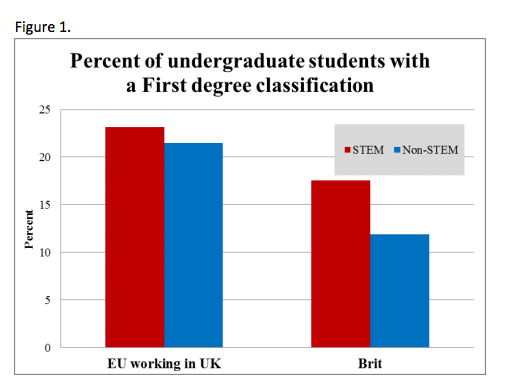 Dr. Renee Luthra and Greta Morando of the Institute for Social and Economic Research recently published a Research Briefing, which counters the ‘demonisation’ of migrants we have ahead of the EU referendum. The authors state that the UK’s ‘key strength is strongly linked to immigration’, and that it is important to understand ‘the potential repercussions of a decline in EU student recruitment and graduate retention’ which may be brought about by a Brexit.
Dr. Renee Luthra and Greta Morando of the Institute for Social and Economic Research recently published a Research Briefing, which counters the ‘demonisation’ of migrants we have ahead of the EU referendum. The authors state that the UK’s ‘key strength is strongly linked to immigration’, and that it is important to understand ‘the potential repercussions of a decline in EU student recruitment and graduate retention’ which may be brought about by a Brexit.
The briefing, using evidence-based analysis, states that over half of EU students stay in the UK, and are ‘more likely than UK students to continue on with further study and to obtain a job commensurate with their training’. They also are ‘very high performers, and are more likely to obtain a first-class degree, less likely to be unemployed, and earn higher salaries, on average, than their UK domiciled peers…’.

As Figure 1 demonstrates, EU students are more likely to earn a First in their degrees than British students in both STEM-related and non-STEM-related subjects by 6 to 9% respectively.
The Briefing concludes by suggesting that Brexit is likely to disrupt the flow of EU students to the UK, which – in other rhetoric – is what the Out Campaigners hope for [argued as an Out vote would allow tighter control on EU migrants].
The authors provide three possibilities:
- ‘EU funding for research from 2007-2013 resulted in a net gain of £2.7 billion for the UK. By reducing the availability of EU funding for research, there would likely be fewer EU-funded paid postgraduate posts.
- ‘In the short term, EU students may be less likely to begin study in the UK, to continue on with study in the UK after graduation, or to work in the UK following graduation given the uncertainty that would result from a vote to leave the EU.
- ‘In the longer term, the impact of Brexit would depend on how future UK governments changed university fees, the availability of loans to study, and visa requirements for EU citizens to study and work in the UK. However, given many of the arguments made in favour of Brexit, it would seem surprising if a UK outside the EU would make it easier for young people from outside the UK to study and work here.’
Meanwhile, London’s new mayor Sadiq Khan pushed the other angle of what it would mean to leave Europe, saying that the decision was about the kind of country the UK wanted to be. In a very ‘patriotic’ and powerful speech, he said that:
“The choice we face is not just about the money in your pocket [but] actually about something even more fundamental than that. It’s about the kind of country we want Britain to be. It’s about who we, the British people, want to be. It’s about our values.”
He continued:
“I believe that the true patriotic case is to remain … So voting to leave the European Union would be turning our back on our very history as a city, who we are and how we look at the world.
“It is our open attitude that helped to build our country. It’s why London became the great city it is today. It’s why we attract the best and the brightest from around the world to make their home here.”